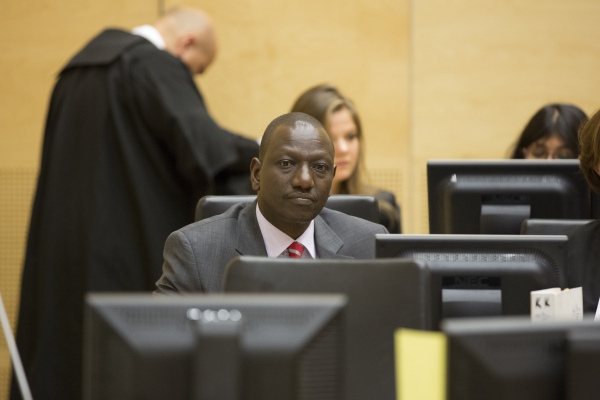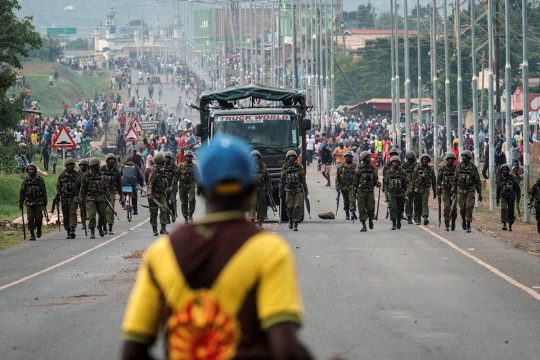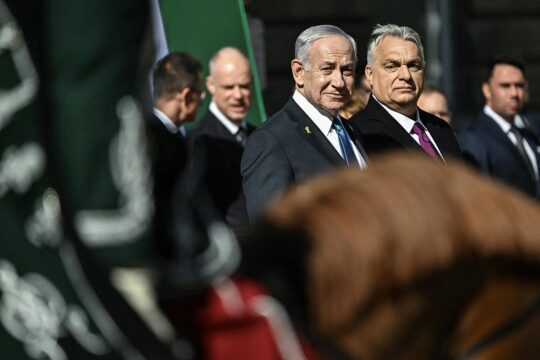The International Criminal Court’s decision to drop charges against Kenyan Deputy President William Ruto, hailed by the President as the end of a “nightmare”, has been celebrated in Kenya as a national victory.
The ICC, accused by some African leaders of being an instrument of neo-colonialism, decided on Tuesday April 5 to drop its case against Ruto and his co-accused, former journalist Joshua Sang. The decision may be appealed and does not exclude the possibility of a new case before the ICC or a Kenyan court. However, it marks a victory for the relentless anti-ICC campaign of African leaders led by Kenya’s young President Uhuru Kenyatta.
The Court decided by a majority of two judges to one to drop the case. It had been asked to decide on a Defence request after the prosecution evidence had been presented. The judges did not grant all the Defence wanted, however, since lawyers for the Accused were calling for an acquittal on grounds of weak prosecution evidence.
William Ruto and Joshua Arap Sang had been on trial since September 10, 2013 on charges of crimes against humanity (murder, deportation or forcible transfer of population and persecution) committed during post-election violence in Kenya in 2007-2008. They both appeared voluntarily before the Court and were not kept in detention. This decision is a new blow for Prosecutor Fatou Bensouda in the Kenya case.
Kenyan President Uhuru Kenyatta, on an official visit to Europe, was quick to react. “This decision brings to a close what has been a nightmare for my nation,” he said. “At the same time, I must remark on the fact that the victory on this matter is partial and the quest for justice incomplete, because the International Criminal Court elected to blindly pursue an ill-conceived, defective agenda at the expense of accountability for the post-election violence.” Speaking from France, he announced a thanksgiving event on April 16 in the stadium of Nakuru, central Kenya. “Each and every Kenyan was touched by the tragedy that befell our nation in 2007/2008,” the President continued. “Not one of them has been forgotten. Their suffering demanded of us as the leadership to seek reconciliation.”
Witness tampering
During the 2007 general elections, Kenyatta was a leading figure in the party of Mwai Kibaki, the president of the time. Uhuru Kenyatta, son of Kenya’s first president Jomo Kenyatta, belongs to the Kikuyu ethnic group. William Ruto, a Kalenjin, supported the opposition candidate Raila Odinga. But in Kenya, political alliances can easily shift. In 2013 Kenyatta and Ruto, both accused by the ICC, ran for the elections together. Despite the ICC case against them, they won in the first round. At the end of 2014, Fatou Bensouda dropped the charges against Kenyatta after several times complaining of witness tampering. Key prosecution witnesses had withdrawn their testimonies. She continued presenting evidence against Ruto and Sang, but also continued to complain that prosecution witness were being intimidated. That was until this new defeat on the afternoon of Tuesday April 5.
In Ruto’s region of Eldoret, people partied all night with traditional Kalenjin music and dancing. According to Kenya’s daily Nation newspaper, Uasin Gishu governor Jackson Mandago, celebrating with the crowd, suggested that President Kenyatta cut short his European visit to join the Deputy President at the party. He also took the opportunity to slam “those who peddled lies against the Deputy President”, advising them to “apologise as this is the only way the country can move forward and forget the scars of the post-election violence.”
The Catholic bishop of Eldoret, Cornelius Korir, hailed a new chapter in the reconciliation process for this region which was the epicentre of the violence in 2007-2008, and called on the faithful to “continue to co-exist peacefully.”
Veteran opposition leader Raila Odinga also shared Ruto’s joy. “It has always been our position that ODM, to which Mr. Ruto was a key member in 2007, planned no violence against other Kenyans,” declared Odinga, who lost the last presidential election. He nevertheless expressed the hope that the government would render justice to victims and grant them reparations so that Kenya can close that chapter of its history.
Fragile reconciliation
But analyst Macharia Gaitho says this is a fragile kind of reconciliation that does not hide the root of the problem. In addition, he writes in the Nation, “no ruling will erase history or obscure the fact that the wounds have not healed” as the country prepares for new general elections this August. Gaitho also fears that Ruto supporters may use this decision for electoral purposes and to threaten those they see as having supported the ICC case against the Deputy President.
Human rights activist Ken Wafula says the decision is a heavy disappointment for the victims, although he encourages them to respect it. He nevertheless hopes that this defeat may serve as a lesson for the ICC’s Office of the Prosecutor, which he urges to build its cases henceforth on “concrete evidence instead of relying on hearsay as witnessed in the Kenyan case”.
“In any case, this decision shows how enormously difficult it is to gather evidence against a senior official who is still in office,” a Tanzanian journalist commented to JusticeInfo.net, “because everywhere, and perhaps even more in Africa, all those in power have long arms. That’s one more reason for African Heads of State to have a champagne toast at their next summit in Kigali, Rwanda, at the end of June!”






